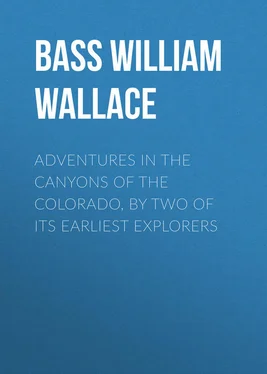These incidents will explain, in great measure, my suspicions and questions as to anything related by Major Powell. Accordingly, when I secured a copy of the Government publication entitled: "Exploration of the Colorado River of the West and its Tributaries, Explored in 1869, 1870, 1871 and 1872, under the Direction of the Secretary of the Smithsonian Institution," and found it was written by Powell, it did not have the same weight with me that it would have done had I not had these personal experiences with him.
It will be recalled by many of my readers that Powell made two trips through the Canyons of the Colorado. Yet in this Government-published volume he makes scant reference to the second trip, and utterly fails to do credit to the members of his party. Why he should have failed to include his experiences and record the names of the men who constituted his force on this second trip has always been a mystery to various explorers of the Canyon, and especially to the members of the party, one of whom was F. S. Dellenbaugh. In his account of this trip in his book, "The Romance of the Colorado River," published in 1906, he states that perhaps this omission was for the sake of dramatic unity. Be this as it may, it has always seemed as if for some reason Powell did not care to do full justice to the brave men who accompanied him on this trip.
When, therefore, a monument was erected to Powell on the south rim of the Grand Canyon, with money appropriated by the Congress of the United States, and a full list of the men who accompanied him on both expeditions was presumably given on the bronze tablet placed on that monument, it was with considerable astonishment that I noted that the names of three men who accompanied the first expedition were omitted.
These men were O. G. Rowland, Seneca Rowland and William Dunn.
In seeking to find the cause for this strange omission, I turned to Powell's own report. On page 96, under date of August 27, he tells of the great difficulties they were beset with:
This morning the river takes a more southerly direction. The dip of the rocks is to the north, and we are rapidly running into lower formations. Unless our course changes, we shall very soon run again into the granite. This gives us some anxiety. Now and then the river turns to the west and excites hope that are soon destroyed by another turn to the south. About nine o'clock we come to the dreaded rock. It is with no little misgiving that we see the river enter these black, hard walls. At its very entrance we have to make a portage; then we have to let down with lines past some ugly rocks. Then we run a mile or two farther, and then the rapids below can be seen.
At eleven o'clock we come to a place in the river where it seems much worse than any we have yet met in all its course. A little creek comes down from the left. We land first on the right, and clamber up over the granite pinnacles for a mile or two, but can see no way by which we can let down, and to run it would be sure destruction.
After another page devoted to discussing the dangers and difficulties ahead of them, Powell continues, on page 98:
After supper Captain (O. G.) Rowland asked to have a talk with me. We walk up the little creek a short distance, and I soon find that his object is to remonstrate against my determination to proceed. He thinks that we had better abandon the river here. Talking with him, I learn that his brother, William Dunn, and himself have determined to go no farther in the boats. So we return to camp. Nothing is said to the other men.
For the last two days our course has not been plotted. I sit down and do this now, … As soon as I determined all this, I spread my plot on the sand, and wake Rowland, who is sleeping down by the river, and show him where I suppose we are and where several Mormon settlements are situated.
We have another short talk about the morrow and he lies down again; but for me there is no sleep. All night long I pace up and down a little path, on a few yards of sand beach, along the river. Is it wise to go on? … For years I have been contemplating this trip. To leave the exploration unfinished, to say that there is a part of the canyon which I cannot explore, having already almost accomplished it, is more than I am willing to acknowledge, and I determine to go on.
Конец ознакомительного фрагмента.
Текст предоставлен ООО «ЛитРес».
Прочитайте эту книгу целиком, купив полную легальную версию на ЛитРес.
Безопасно оплатить книгу можно банковской картой Visa, MasterCard, Maestro, со счета мобильного телефона, с платежного терминала, в салоне МТС или Связной, через PayPal, WebMoney, Яндекс.Деньги, QIWI Кошелек, бонусными картами или другим удобным Вам способом.












